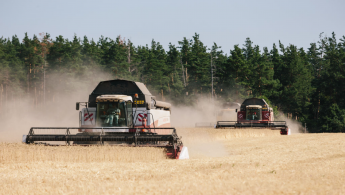Ukraine grain storage shortage adds to farmers' woes
Ukraine has insufficient storage capacity even for its reduced 2022 grain harvest, the United Nations' World Food Programme said on Tuesday, with the country struggling to export existing stocks during the invasion by Russia.
Jakob Kern, the World Food Programme's emergency coordinator in Ukraine, cited estimates that 20 percent of planted areas in Ukraine will not be harvested in July and that the spring planting area will be about a third smaller than usual.
Ukraine is the world's fifth-biggest exporter of wheat and in the top three for maize, barley and sunflower seeds. Wheat production in 2021 was about 40 million tonnes, with another 50 million tonnes for the other three commodities.
A big challenge this year is the exporting of existing grain stocks to provide storage capacity for the 2022 harvest and generate cash to buy seeds and fertilisers for the next planting season, Kern told a Geneva news briefing via video link from Ukraine.
Kern cited the country's agriculture ministry as saying Ukraine used to export almost all its grain and oilseeds – up to 6 million tonnes a month – via seaports that are now blocked by the conflict.
"The minister told us last week that the main concern at this stage is the lack of storage capacity to bring in the 2022 grain harvest. An estimated 15 million tonnes of grains will not have space in the silos around the country," he said.
If Ukraine cannot export its current stocks, farmers may not be able afford harvesting costs, let alone plant the next year's crop, he added.
The lack of Ukrainian grain on world markets has been pushing up food prices around the world. The World Food Programme is spending $70 million more a month to buy the same amount of food as last year, Kern said.
(Reuters)





 Follow the Middle East's top stories in English at The New Arab on Google News
Follow the Middle East's top stories in English at The New Arab on Google News
![The UAE is widely suspected of arming the RSF militia [Getty]](/sites/default/files/styles/image_330x185/public/2024-11/GettyImages-472529908.jpg?h=69f2b9d0&itok=Yauw3YTG)
![Netanyahu furiously denounced the ICC [Getty]](/sites/default/files/styles/image_330x185/public/2024-11/GettyImages-2169352575.jpg?h=199d8c1f&itok=-vRiruf5)
![Both Hamas and the Palestinian Authority welcomed the ICC arrest warrants [Getty]](/sites/default/files/styles/image_330x185/public/2024-11/GettyImages-2178351173.jpg?h=199d8c1f&itok=TV858iVg)